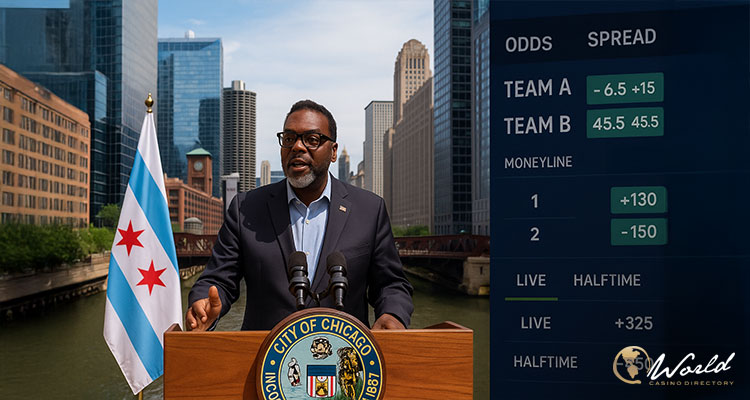Chicago Mayor Brandon Johnson has proposed a 10.25% local tax on adjusted gross sports betting revenue as part of his 2026 city budget. The new measure aims to generate approximately $26 million annually and help close the city’s $1.15 billion budget gap—without raising property taxes.
The proposal, included in Johnson’s $16.6 billion “Protecting Chicago Budget,” would take effect on January 1, 2026, if enacted by the City Council. According to city documents, the tax targets a rapidly expanding industry that has seen billions wagered nationwide, ensuring it “contributes to the City’s shared priorities.”
Rising Tax Pressure in Illinois
If approved, Chicago’s new tax would add to an already heavy financial load on Illinois sportsbook operators. In July 2025, the state implemented a per-wager surcharge—25 cents on the first 20 million online bets per operator per fiscal year, and 50 cents thereafter. Within its first two months, this surcharge generated more than $10 million in revenue. Large operators like FanDuel and DraftKings are expected to exceed the 20-million-bet mark annually, triggering the higher 50-cent rate.
Illinois lawmakers also introduced a progressive tax system in July 2024, replacing the previous 15% flat rate on adjusted gross revenue (AGR). The new structure imposes rates ranging from 20% to 40%, depending on the operator’s yearly revenue tier, and has already resulted in an additional $261.9 million in tax collections compared to the prior fiscal year.
If Chicago’s local tax takes effect, operators would face combined rates that could exceed 50% once state, county, and city levies are added together—potentially rising above 60% for top earners like FanDuel and DraftKings when including per-wager surcharges.
The sports betting industry has voiced strong opposition to repeated tax hikes. The Sports Betting Alliance (SBA), which represents major sportsbooks including BetMGM, DraftKings, FanDuel, and Fanatics, has warned that higher taxes could drive bettors toward unregulated offshore sites. “Unregulated, offshore operators offer cheaper sports betting alternatives for consumers, without any protections — including age verification — and without any oversight, not to mention no tax revenue whatsoever,” the SBA stated.
In response to the state’s 2025 per-wager tax, some sportsbooks have already raised transaction fees and minimum bet amounts. Similar adjustments may follow if Chicago enacts its proposed 10.25% city tax, as operators attempt to offset costs while maintaining profitability.
Legislative Process and Budget Outlook
To move forward, the proposal requires approval from at least 26 of the City Council’s 50 alderpersons after review by the Committee on Budget and Government Operations. While a Chicago financial task force previously recommended a smaller per-bet levy of 25 or 50 cents projected to raise between $8.5 million and $17 million, Johnson chose to pursue a percentage-based model for greater long-term returns.
The mayor described the budget as a “fair and balanced revenue strategy,” asserting that profitable industries should contribute more to support essential city programs. His plan seeks to strengthen fiscal stability while protecting working families from additional tax burdens.
However, the proposal’s political path may be complicated by related gambling issues. Johnson has opposed legalizing video gaming terminals (VGTs) in Chicago, despite some aldermen considering them as potential trade-offs during negotiations. Approving VGTs could risk Bally’s forfeiting its $4 million annual host community payment tied to its casino operations in the River West neighborhood.
As reported by InGame, Bally’s temporary casino at the Medinah Temple in River North has underperformed since opening in 2023, generating $16.1 million in city tax revenue in 2024 and $11.4 million through September 2025—well below earlier projections. Still, Johnson’s budget anticipates $44 million in 2026 from Bally’s permanent casino, expected to open later in the year.
If enacted, the proposed sports betting tax would mark the third consecutive year Illinois operators face new fiscal measures targeting their profits. For now, it remains uncertain whether the City Council will approve Johnson’s plan or seek compromises in the final version of Chicago’s 2026 budget.


